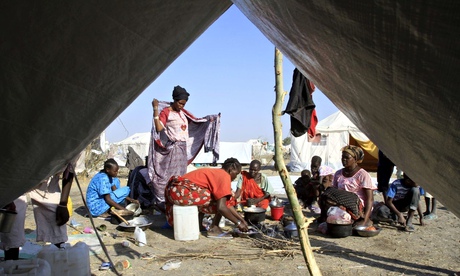
Vaccinations could be the solution to cholera outbreaks in unsanitary conditions such as refugee camps. Photograph: Ashraf Shazly/AFP/Getty Images
With news of the worsening cholera crisis in South Sudan – reported by WHO to have killed 62 people and affected 2,400 more – and an anticipated outbreak in Syrian refugee camps in northern Iraq, the need for a robust international response grows. Such a situation reveals the tension between advocates for vaccines and those pressing for action on sanitation.
Cholera is a form of acute watery diarrhoea, which spreads from person to person through food and water contaminated with the bacterium vibrio cholerae. It is a miserable condition involving massive fluid loss and dehydration and left untreated can quickly lead to death. Cholera is common in places with poor water and sanitation – WHO estimates 3 to 5 million cases and up to 120,000 cholera deaths globally each year – but it’s when large epidemics occur that cholera grabs the world’s attention. The disease is highly contagious and rapidly acting, so outbreaks can be explosive.
The need for a multi-tool and integrated approach to prevention and control is widely acknowledged, but new evidence for the effectiveness of vaccines is pushing the debate toward their more widespread use, especially during outbreaks.
A new study about an outbreak in Guinea shows that two doses of the oral cholera vaccine Shanchol were able to protect people by 86%. In their vaccination strategy, Médicin Sans Frontières (MSF) and the Guinean ministry of health were able to administer over 300,000 doses of the vaccine in two rounds to the affected coastal districts, covering 75% of the population, reducing transmission of cholera and containing the outbreak. The authors of the study say that this vaccine provides protection quickly and should be used to control future outbreaks.
Shanchol was reported to be safe and efficacious in a larger trial in Kolkata with long-term results, and it is cheap: two doses cost about $ 3, or about one-third the price of the only other WHO-pre-qualified vaccine Dukoral, which has a shorter length of protection and is mostly geared toward travellers.
Both Dukoral and Shanchol require refrigeration, which is impossible in many settings, and with the more expensive product a large amount of clean water is needed for mixing the vaccine before consumption – again, unavailable in the impoverished environments where cholera is endemic or where outbreaks occurs.
Two weeks ago it was announced that another Indian firm is developing a cheaper powder form of the cholera vaccine that may require only one dose, no refrigeration, and just $ 1 to purchase. The non-profit biotechnology company Hilleman Laboratories, backed by Merck & Co and the Wellcome Trust, says it is starting clinical trials next year.
But issues around vaccine delivery, their feasibility and acceptability to communities, as well as cost concerns will continue to plague the vaccine approach to cholera. Critics have questioned whether the extensive resources required to develop, manufacture, purchase and deploy vaccines across affected populations would be better spent on basic water and sanitation infrastructure. Robust water and sewage systems are what prevents cholera from being an issue in developed countries. Indeed, even though WHO began last year stockpiling Shanchol for emergencies, it advises the use of simple oral rehydration solution as the first line approach to cholera, which is both cheap and widely available, or antibiotics for more severe diarrhoeal cases. The vaccine has not been regarded as a key public health tool.
During the cholera outbreak after the 2010 Haiti earthquake attempts for a vaccine campaign by the medical charity Partners in Health were spurned by the local government and public health officials concerned with costs and unconvinced by the vaccine’s effectiveness. Other NGOs working in the field feared that attention and resources directed toward a vaccine campaign that could cover just a fraction of the population would deflect from the need to provide clean water and permanent sanitation infrastructure.
After all, access to clean water and sanitation (which 2.5 billion people lack – half the developing world) is a precondition for improvements in most if not all other areas of health and development: poverty, hunger, gender-based violence and education to name a few. Any attention to water and sanitation in the cholera context, then, will bring wider and necessary benefits to populations.
Undeniably the key to controlling cholera is clean water, sanitation, and hygiene. The challenge is to press for attention to these more basic needs even as new research strengthens the case for implementing cholera vaccination programmes to prevent, treat, and eliminate this deadly disease.
Dr Jocalyn Clark is executive editor at International Centre for Diarrheal Disease Research. Follow @jocalynclark on Twitter.
Read more stories like this:
• Vaccine development: thinking out of the cold box
• 9 things to remember before changing the world with a malaria vaccine
• How Brac took diarrhoea remedies to every home in Bangladesh – video
Join the community of global development professionals and experts. Become a GDPN member to get more stories like this direct to your inbox
Cholera vaccine: the rapid-correct to the South Sudan outbreak?
Hiç yorum yok:
Yorum Gönder